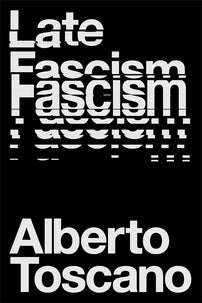Fascists Love Freedom
Alberto Toscano argues that understanding contemporary fascism requires undoing a knee-jerk identification of fascism with a monolithic, bureaucratic state and its opposition to liberalism in all forms.

While the practical work of halting and reversing the catastrophic march of the right is still lacking in strategy and force on too many fronts, the recent international debate on the new faces of reaction has been vibrant, if not always productive. Here I address some of the problems that arise in revisiting the theoretical debate on fascism in an epoch whose governing ideology and dominant class strategy many still think are best captured by the idea of neo-liberalism – however mutant, recombinant or terminal the latter may be.
How, I want to ask, are we to conceptualise the connection between novel variants of what Karl Polanyi once termed ‘the fascist virus’ and the mutable instantiations of neoliberalism, beyond the familiar if fallacious assumption of a basic incompatibility between these two complexes of political ideas and practices? Can a more nuanced theorisation of the place of the state in fascist and neoliberal practice provide some insight into the fascist potentials harboured by our current moment? And how might that theorisation relate to the vexed status of freedom in fascist discourse?
Received wisdom suggests that at the core of historical fascisms lay a violent aversion toward liberalism in all its guises, animated by an unchecked worship of the state as the hallowed vehicle for national and racial rebirth through inner- and outer-directed violence. Fascism, as the philosopher Giovanni Gentile – minister of education in the first two years of the regime and ghost-writer for Mussolini’s 1932 ‘The Doctrine of Fascism’ – affirmed, would thus be a ‘statolatry’. Conversely, the common sense about neoliberalism has portrayed it as driven by a veritable phobia of the state, a desire to limit the latter’s interventionist hindrances to the freedoms of the market and the aspirations of the possessive individual or the entrepreneurial subject.
In the interminable seesaw of analogies and disanalogies that occupies so much of the public and academic debate about the contemporaneity of fascism, the notion of freedom has played a not insignificant, if at times muted or implicit, part. Liberal inventories of the elements of fascism will often identify the exaltation of the state and the repudiation of liberty as leading symptoms, finding contemporary movements and ideologies of the far right lacking in that department. Today’s revamped authoritarian populisms spawn sundry Freedom Parties, and liberty is their leitmotiv – liberty from so-called ‘medical totalitarianism’, for and of property ownership, or as a marker of civilisational difference from migrants and their religions. There are choice examples of this trend in Andreas Malm and the Zetkin Collective’s formidable panorama of an emergent ‘fossil fascism’:
The doctrine of ‘energy dominance ’ was annotated with some classical American freedom speak, when the Department of Energy in 2019 began to refer to fossil gas as ‘freedom gas’, to be exported without constraints around the world. Official documents from this Department, still headed by Rick Perry, spoke of fossil fuels as ‘molecules of U.S. freedom’.
Elsewhere, we come across Rainer Kraft, the climate spokesman for the xenophobic Alternativ für Deutschland, decrying the fact that mainstream parties in Germany are ‘threatening the end of the world and stirring up mass hysteria, so that people will accept that more and more of their property and their freedom are stolen’. But are the liberal, neoliberal and libertarian notes in the contemporary discourse of the far-right markers of an unbridgeable discontinuity with interwar historical fascisms?
I want briefly to explore the proposition that, in several ways, conceptions of freedom (at both the individual and collective levels) were not (and are not) alien to fascism, and that we may gain in our understanding of fascist potentials and subjectivities by tarrying with that apparent oxymoron, fascist freedom. This requires undoing our knee-jerk identification of fascism with a monolithic, bureaucratic state and its opposition to liberalism in all its forms. Fascism’s relations with both liberalism and freedom are far more tortuous and less comforting than their assumed antithesis suggests. Undoing our common sense about the place of freedom and the state in fascist formations can also pave the way for a more nuanced understanding of fascist potentials within neoliberalism and how these might be seeded by racialised visions of capitalist order.
In his recent White Freedom: The Racial History of an Idea, the late historian Tyler Stovall, having traced the racial entanglements of ideologies of liberty across European imperialism, settler-colonialism and plantation slavery, judiciously observes that ‘ideas of freedom did play a significant role in the ideology of fascism’ – which should perhaps not come as a surprise given that those historical phenomena of domination shaped fascism’s self- conception. Writing in 1941 in the pages of Studies in Philosophy and Social Science, the English-language journal of the Institute for Social Research in exile, Herbert Marcuse would declare that ‘under the terror that now threatens the world the ideal constricts itself to one single and at the same time common issue. Faced with Fascist barbarism, everyone knows what freedom means.’ Unfortunately, that may not always be the case.
An adapted excerpt from Late Fascism: Race, Capitalism and the Politics of Crisis by Alberto Toscano
[book-strip]
